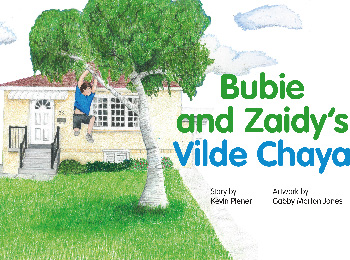Keppe, vilde chaya, kvel, bisl, schtickle, mensch, nosh and boytchik are some of the Yiddish words grandparents and parents will revisit, and children will learn, in the book Bubie and Zaidy’s Vilde Chaya.
Author Kevin Plener wrote the illustrated children’s book in English, using Yiddish names of animals to engage kids and inject humour as well as language into the story.
The book, published in 2014 by Bisl of Publishing, chronicles the adventures of a mischievous boy confused by the meaning of vilde chaya (wild animal), a Yiddish expression his grandparents use to describe him.
Through a special adventure, the boy gains a better understanding of himself and, more importantly, of the immeasurable love that his bubbie and zaide have for him.
Bubie and Zaidy’s Vilde Chaya was written to strengthen the Yiddish yarn that knits us together.
“Who knows, maybe someday we’ll have enough words to knit a blanket,” said Plener, who describes himself as a “Yidd-ish” writer.
“I say Yidd-ish, because I don’t speak Yiddish, let alone read or write in Yiddish. Yiddish was the language of my grandparents and great-grandparents. It has a long and rich tradition, and when my grandparents spoke it, I thought it was hilarious. Once I had the idea, the story flooded out of me,” he said.
Plener’s daughter, Noa, is a large part of why he wrote the book.

Author Kevin Plener is seen with his three-year-old daughter Noa and his 89-year-old Zaide Usher Krasowsky.
“When I knew I was going to have my daughter, one of the saddest thoughts I had was knowing there probably wouldn’t be anyone left to speak Yiddish to her.
“Seeing my now three-year-old daughter – and my six-week-old son, who already has a mischievous sparkle in his eye – laugh at the same Yiddish words I heard so many years ago, I have come to understand a humble truth: we are all Yids.
“When I read the book to Noa for the first time, she was engaged with the pictures, but she would also laugh at the same words that would amuse me as a kid,” he said.
When he was growing up, Plener’s late bubbie, Ruth Krasowsky, and his zaide, Holocaust survivor Usher Krasowsky, spoke Yiddish to him.
“Yiddish is simply a timeless, endless yarn that knits all Yids across generations.
“Yiddish was used when my grandparents didn’t want me to understand, or when they were saying something out of love. They would make me laugh, even though I didn’t understand. It was part of their charm and what made them special,” Plener recalled.
“The book took two years to bring to life. The story was written with memories of my childhood but is also make-believe.
“My bubbie was really supportive. She helped me with the Yiddish words, and went on to help me when I was editing the book. Although she never saw the finished product, she did see it story-boarded,” he said.
Plener recognizes that the Yiddish language has less practical use as the number of its speakers slowly decreases.
“Loving the tradition it represents, it would be a tragedy to let history, along with so many funny words, disappear in the Diaspora. I know that there is a Yiddish saying for it: loosely translated, the saying goes, ‘If we won’t remember, then who?’ Or, ‘If we don’t speak, we will forget,’” he said.
The first printed copy of the book went to Plener’s zaide.
When this reporter asked what he thought about the book, Zaide Usher said, “What book?” He paused, then laughed. “I am very proud of Kevin. I remember him running around our home as a child and climbing the pear tree in our yard. The pictures in the book brought back memories and the story made me smile when I read it. Ruth would have loved the book… she would have loved anything Kevin did.”
It was geared for grandparents, but Plener would love to see Vilde Chaya in school libraries, synagogues and Judaica gift shops, retirement facilities and children’s book stores.
“This book is for anyone with Yiddish in their heart. It’s a bedtime story that bubbies and zaides, sabas and savtas, grandmas and grandpas – especially those who don’t speak Yiddish – can have on their ‘sleepover bookshelf.’ It’s a story to read to your grandchildren when you really want to say something with love… to say something with Yiddish,” Plener said.
The book is available online at www.jewishbedtimestory.com; www.thatyiddishkidsbook.com or through amazon.ca
